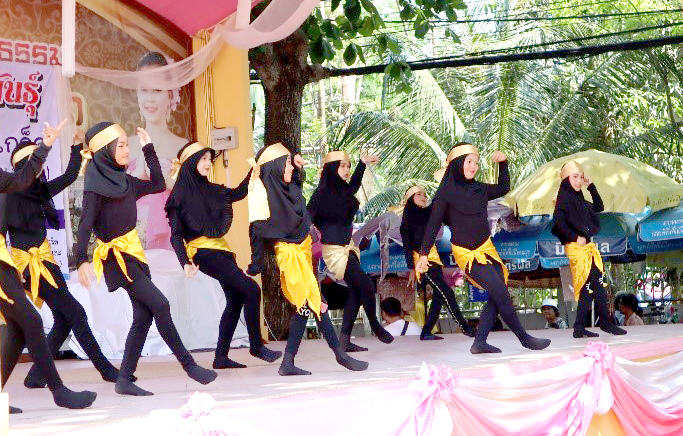Multicultural Activities to Promote Cultural Tourism in Ko Kret, Nonthaburi Province
Main Article Content
Abstract
Ko Kret community, Nonthaburi province is a multicultural society that Thai Buddhists, Thai Mon and Thai Muslims with a history of coexistence. The objectives of this research are therefore to select and organize cultural activities that integrate multi-cultural identities of Thai Buddhists, Thai Mon and Thai Muslims in Ko Kret through the participatory action research process. The research implementation was as follows: 1) Searching for common identities of multiculturalism; 2) Selecting cultural activities that reflect common identities, and 3) Creating guidelines for organizing cultural activities that reflect common identities. The guidelines for organizing cultural activities can be classified into 7 steps as follows: 1) Setting community goals; 2) Appointing working groups; 3) Planning; 4) Building networks; 5) Spreading the message and publicizing information; 6) Organizing activities; and 7) Monitoring and evaluation. The research shows that the cultural identities of Ko Kret is a result of communal appreciation and mutual acceptance presented through the “living together in peace” principle. Such aspect is observable through the community’s appreciation of their own history, fair shares in resources, and respect towards rules for coexistence. Additionally, the community’s presentation of their common identities through cultural performances that combine and integrate the features of performing arts among Thai Buddhists (Thai Dance), Thai Mon (Mon Dance) and Thai Muslims (Li-ke-hulu) during the Ko Kret Songkran festival contributes enormously to the communal pride. In summary, Ko Kret community appreciates the value of their common identities, takes great pride, and acknowledges the shared cultural space, while providing multi-cultural activities under the community mechanism collaboratively run by appointed committee and Ko Kret Subdistrict Administrative Organization, which promotes new trends in cultural tourism of Ko Kret.
Article Details

This work is licensed under a Creative Commons Attribution-NonCommercial-NoDerivatives 4.0 International License.
Area Based Development Research Journal values copyright protection and licensing to safeguard author rights and facilitate the appropriate dissemination of research. Our policies ensure openness, accessibility, and attribution. Authors retain copyright ownership, and articles are published under a Creative Commons Attribution License (CC BY), allowing sharing, adaptation, and proper attribution. Authors have the freedom to publish under the CC BY license, granting broad reuse and distribution permissions. The journal supports posting articles on third-party repositories, adhering to institutional and funding restrictions. Author guidelines detail copyright and licensing requirements, empowering authors with knowledge about their rights and responsibilities. These policies cultivate an environment of collaboration, openness, and responsible sharing, benefiting authors and the research community while honoring intellectual property rights.
References
Ampansirirat, A., & Wongchaiya, P. (2017). The participatory action research: key features and application in community. Journal of Humanities and Social Sciences, Mahasarakham University, 36(6), 192-202. (in Thai).
Boonmee, T. (2004). Civil society. Bangkok: Saitharn. (in Thai).
Community Development Department, Ministry of Interior. (2017). Guidelines for establishing and developing professional groups. Retrieved February 14, 2020, from http://ratchaburi.cdd.go.th/wp-content/uploads/sites/51/2018/02/แนวทางการจัดตั้งและพัฒนากลุ่มอาชีพ.pdf. (in Thai).
Feungfusakul, A. (2003). Identity. Bangkok: National Research Council of Thailand. (in Thai).
Ganjanapan, A. (2008). Multiculturalism in the context of social and cultural change. Chiang Mai: Chiang Mai University. (in Thai).
Jenkins, R. (2004). Social identity. (2nd ed.). London and New York: Routledge.
Kemmis, S., & McTaggart, R. (1988). The action research planner. (3rd ed.). Victoria: Deakin University.
Khunweechuay, M., & Sukphan, N. (2011). Cultural compatibility between Thai – Buddhist and Thai – Muslim in province of Pattalung.
Wichcha Journal Nakhon Si Thammarat Rajabhat University, 30(1), 221-233. (in Thai).
Lohsomboon, N., & Boonyananta, S. (2019). Art activities to promote old community tourism in Bangkok metropolitan region. Fine Arts Journal Srinakharinwirot University, 23(1), 97-108. (in Thai).
Naiyapatana, O. (2005). Quantitative and qualitative research methodologies. Bangkok: Samlada. (in Thai).
Niyomrath, R. (2011). Identity of Thai benjarong pattern (Research report). Bangkok: Suan Sunandha Rajabhat University. (in Thai).
Pangsoi, K. (2018). Community leaders’ cultural management in activity enhancement for social security and sustainability. Journal of MCU Social Science Review, 7(1), 32-42. (in Thai).
Prangwattanakun, S., & Ongsakul, S. (2018). Multicultural society. Chiang Mai: Lanna Education Center, Chiang Mai University. (in Thai).
Wanlam, D. (2009). The development of the concept of reconciliation culture of a multicultural society as per the views of border patrol police with experience in working in the three southern border provinces (Research report). Songkhla: Thaksin University. (in Thai).


